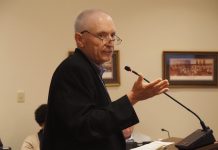While the criminal trial for the suspended Hope town marshal may be finished, there’s still the matter of a civil lawsuit filed in Bartholomew Circuit Court.
The suit, which alleges civil rights violations, was filed by Anthony Wayne Paul, 50, of East Lakeshore Drive South against suspended Town Marshal Donald R. “Randy” Bailey and the town of Hope.
According to the formal complaint prepared by attorney Dan Patterson, Bailey, 51, acted “wrongfully, unlawfully and maliciously” when he told other law enforcement agencies Paul had threatened him, refused his demand to leave his property and fled after being told he was under arrest.
Eleven months after Paul was arrested on intimidation and criminal trespassing charges, Bailey’s allegations unraveled after a digital audio recording surfaced of the actual conversation. Charges against Paul were dropped on the same day Bailey was arrested.
Bailey was convicted Wednesday of Class D felony misconduct and Class B misdemeanor false informing. He is scheduled to be sentenced March 24 by Judge Stephen Heimann.
In the formal complaint filed in Heimann’s court on May 20 of last year, Paul maintains he “has suffered mental and bodily distress, and was subjected to humiliation, embarrassment and scorn among those who knew him and his children and was otherwise injured in his reputation” as a result of Bailey’s actions on behalf of the town of Hope.
The Schaefer Lake resident is seeking an unspecified amount for costs and all other “just and proper” relief against Bailey and the town of Hope.
In a response filed June 23, the town of Hope denied Bailey had acted as town marshal at the time Paul was arrested.
Through Indianapolis attorney James S. Stephenson, the town of Hope stated it never had sufficient knowledge to form a belief as to the truth of Bailey’s allegations against Paul.
The town also is denying the extent of damages Paul suffered as a result of his arrest.
The most recent entry made into the case file, dated Aug. 22, was Bailey’s response.
In the document prepared by attorneys Matthew L. Hinkle and John V. Maurovich, Bailey denied he provided false information that led to Paul’s arrest.
Bailey also maintained he acted reasonably and in good faith, and is entitled to qualified immunity, according to the response.
Bailey’s attorneys cited state laws that contend the suspended marshal is not liable for “the initiation of a judicial or administrative proceeding, the performance of a discretionary function, or the act or omission of anyone other” than Bailey.
Attorneys for Bailey and the town of Hope cited statutes saying the lawsuit shouldn’t go forward for one or more of the following reasons:
The claim wasn’t made to the town within 180 days after the loss occurred.
Paul failed to describe several details in the claim regarding the loss, as well as the amount of damages sought.
Notice wasn’t given to the town either in person or by registered or certified mail.




